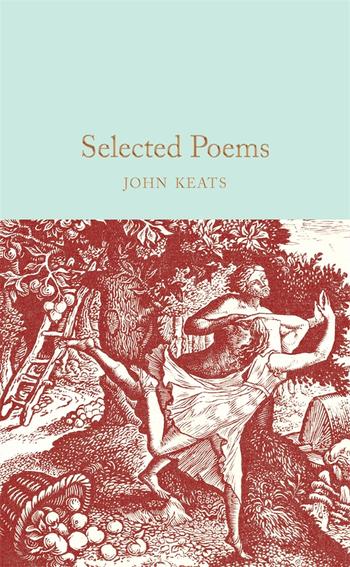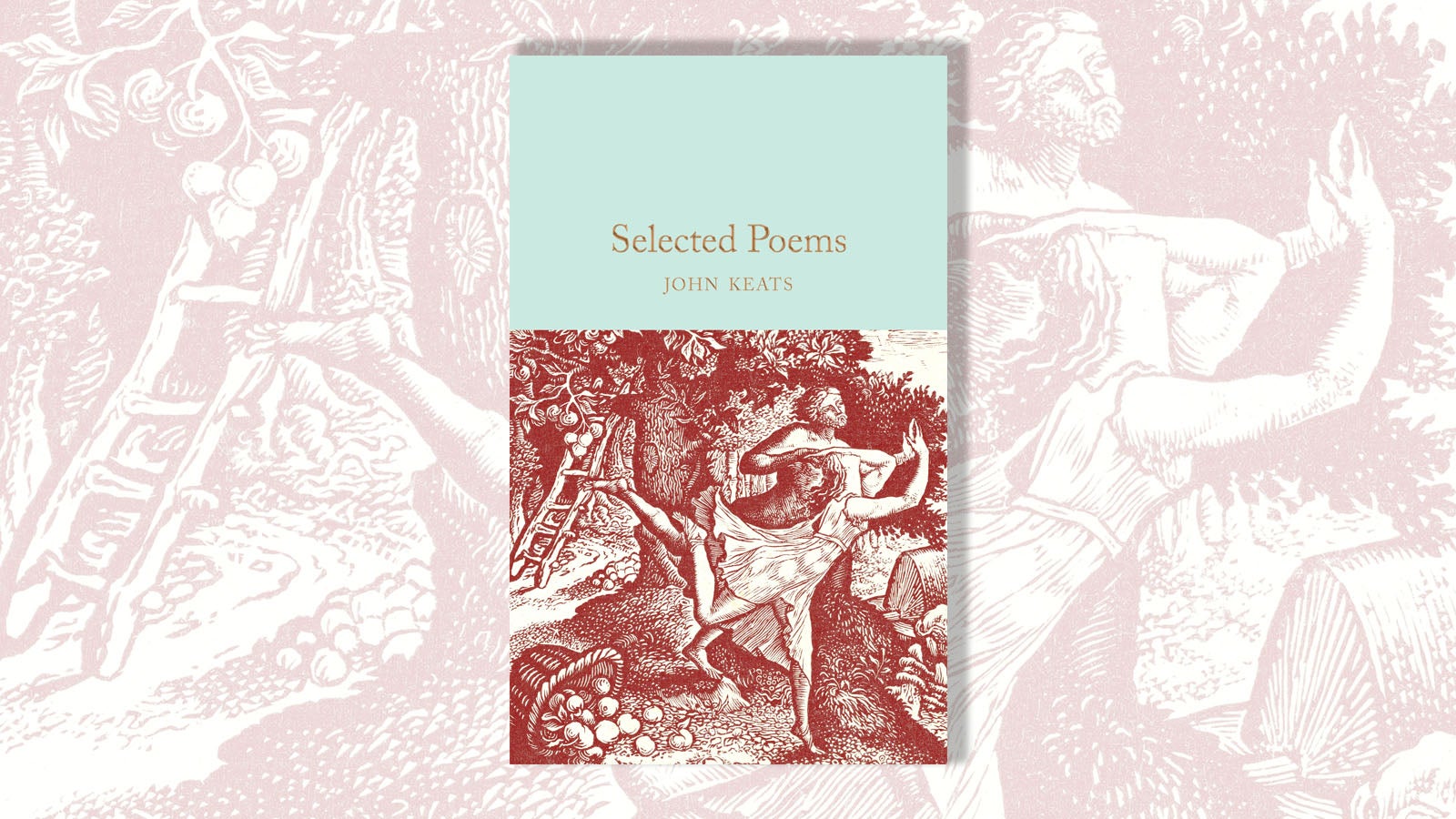The Macmillan Collector's Library collection, Selected Poems, celebrates Keats’s greatest works, drawing on the poetry published both during his lifetime and after his death. Discover a selection of our favourite John Keats poems from the collection, below.
Discover our edit of the best poetry books.
The Macmillan Collector's Library collection, Selected Poems, celebrates Keats’s greatest works, drawing on the poetry published both during his lifetime and after his death. Discover a selection of our favourite John Keats poems from the collection, below.
Discover our edit of the best poetry books.
The poet John Keats wrote with great insight and emotion about art and beauty, love and loss, suffering and nature. His famous poems include ‘Ode on a Grecian Urn’ and ‘La Belle Dame Sans Merci’. Despite his first volume of poetry being published only four years before he died from tuberculosis at the age of twenty-five, he came to be regarded as one of the greatest poets of the Romantic movement, alongside Byron, Shelley and Wordsworth. This year marks the 200th anniversary of Keats' death. During his lifetime, however, his writing was not well-received by critics and his talent remained largely unrecognized. Two hundred years after his death, he is one of England’s most beloved poets.
Ode on a Grecian Urn
Thou still unravish'd bride of quietness,
Thou foster-child of silence and slow time,
Sylvan historian, who canst thus express
A flowery tale more sweetly than our rhyme:
What leaf-fring'd legend haunts about thy shape
Of deities or mortals, or of both,
In Tempe or the dales of Arcady?
What men or gods are these? What maidens loth?
What mad pursuit? What struggle to escape?
What pipes and timbrels? What wild ecstasy?
Heard melodies are sweet, but those unheard
Are sweeter; therefore, ye soft pipes, play on;
Not to the sensual ear, but, more endear'd,
Pipe to the spirit ditties of no tone:
Fair youth, beneath the trees, thou canst not leave
Thy song, nor ever can those trees be bare;
Bold Lover, never, never canst thou kiss,
Though winning near the goal yet, do not grieve;
She cannot fade, though thou hast not thy bliss,
For ever wilt thou love, and she be fair!
Ah, happy, happy boughs! that cannot shed
Your leaves, nor ever bid the Spring adieu;
And, happy melodist, unwearied,
For ever piping songs for ever new;
More happy love! more happy, happy love!
For ever warm and still to be enjoy'd,
For ever panting, and for ever young;
All breathing human passion far above,
That leaves a heart high-sorrowful and cloy'd,
A burning forehead, and a parching tongue.
Who are these coming to the sacrifice?
To what green altar, O mysterious priest,
Lead'st thou that heifer lowing at the skies,
And all her silken flanks with garlands drest?
What little town by river or sea shore,
Or mountain-built with peaceful citadel,
Is emptied of this folk, this pious morn?
And, little town, thy streets for evermore
Will silent be; and not a soul to tell
Why thou art desolate, can e'er return.
O Attic shape! Fair attitude! with brede
Of marble men and maidens overwrought,
With forest branches and the trodden weed;
Thou, silent form, dost tease us out of thought
As doth eternity: Cold Pastoral!
When old age shall this generation waste,
Thou shalt remain, in midst of other woe
Than ours, a friend to man, to whom thou say'st,
"Beauty is truth, truth beauty,—that is all
Ye know on earth, and all ye need to know."
La Belle Dame Sans Merci
O what can ail thee, knight-at-arms,
Alone and palely loitering?
The sedge has withered from the lake,
And no birds sing.
O what can ail thee, knight-at-arms,
So haggard and so woe-begone?
The squirrel’s granary is full,
And the harvest’s done.
I see a lily on thy brow,
With anguish moist and fever-dew,
And on thy cheeks a fading rose
Fast withereth too.
I met a lady in the meads,
Full beautiful—a faery’s child,
Her hair was long, her foot was light,
And her eyes were wild.
I made a garland for her head,
And bracelets too, and fragrant zone;
She looked at me as she did love,
And made sweet moan
I set her on my pacing steed,
And nothing else saw all day long,
For sidelong would she bend, and sing
A faery’s song.
She found me roots of relish sweet,
And honey wild, and manna-dew,
And sure in language strange she said—
‘I love thee true’.
She took me to her Elfin grot,
And there she wept and sighed full sore,
And there I shut her wild wild eyes
With kisses four.
And there she lullèd me asleep,
And there I dreamed—Ah! woe betide!—
The latest dream I ever dreamt
On the cold hill side.
I saw pale kings and princes too,
Pale warriors, death-pale were they all;
They cried—‘La Belle Dame sans Merci
Thee hath in thrall!’
I saw their starved lips in the gloam,
With horrid warning gapèd wide,
And I awoke and found me here,
On the cold hill’s side.
And this is why I sojourn here,
Alone and palely loitering,
Though the sedge is withered from the lake,
And no birds sing.
On Leaving Some Friends at an Early Hour
Give me a golden pen, and let me lean
On heaped up flowers, in regions clear, and far;
Bring me a tablet whiter than a star,
Or hand of hymning angel, when ’tis seen
The silver strings of heavenly harp atween:
And let there glide by many a pearly car,
Pink robes, and wavy hair, and diamond jar,
And half-discovered wings, and glances keen.
The while let music wander round my ears,
And as it reaches each delicious ending,
Let me write down a line of glorious tone,
And full of many wonders of the spheres:
For what a height my spirit is contending!
’Tis not content so soon to be alone.
To Sleep
O soft embalmer of the still midnight,
Shutting, with careful fingers and benign,
Our gloom-pleased eyes, embowered from the light,
Enshaded in forgetfulness divine:
O soothest Sleep! if so it please thee, close
In midst of this thine hymn, my willing eyes,
Or wait the ‘Amen’, ere thy poppy throws
Around my bed its lulling charities.
Then save me, or the passèd day will shine
Upon my pillow, breeding many woes;
Save me from curious conscience, that still hoards
Its strength for darkness, burrowing like the mole;
Turn the key deftly in the oilèd wards,
And seal the hushèd casket of my soul.
On the Grasshopper and Cricket
The poetry of earth is never dead:
When all the birds are faint with the hot sun,
And hide in cooling trees, a voice will run
From hedge to hedge about the new-mown mead –
That is the Grasshopper’s. He takes the lead
In summer luxury; he has never done
With his delights, for when tired out with fun
He rests at ease beneath some pleasant weed.
The poetry of earth is ceasing never:
On a lone winter evening, when the frost
Has wrought a silence, from the stove there shrills
The Cricket’s song, in warmth increasing ever,
And seems to one in drowsiness half lost,
The Grasshopper’s among some grassy hills.
Selected Poems
by John Keats

This wonderful collection of Keats’s work brings together poems which were published both during his lifetime and posthumously, from his famous odes to beautiful ballads.



